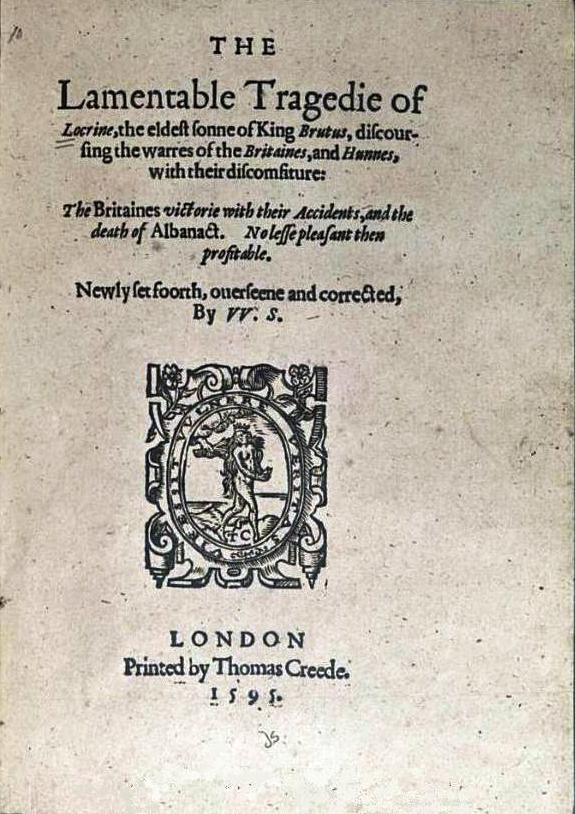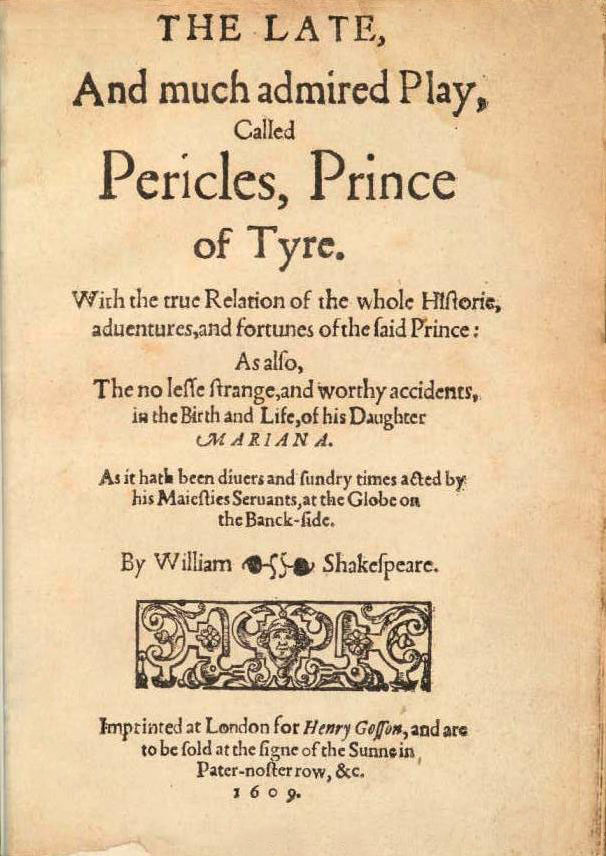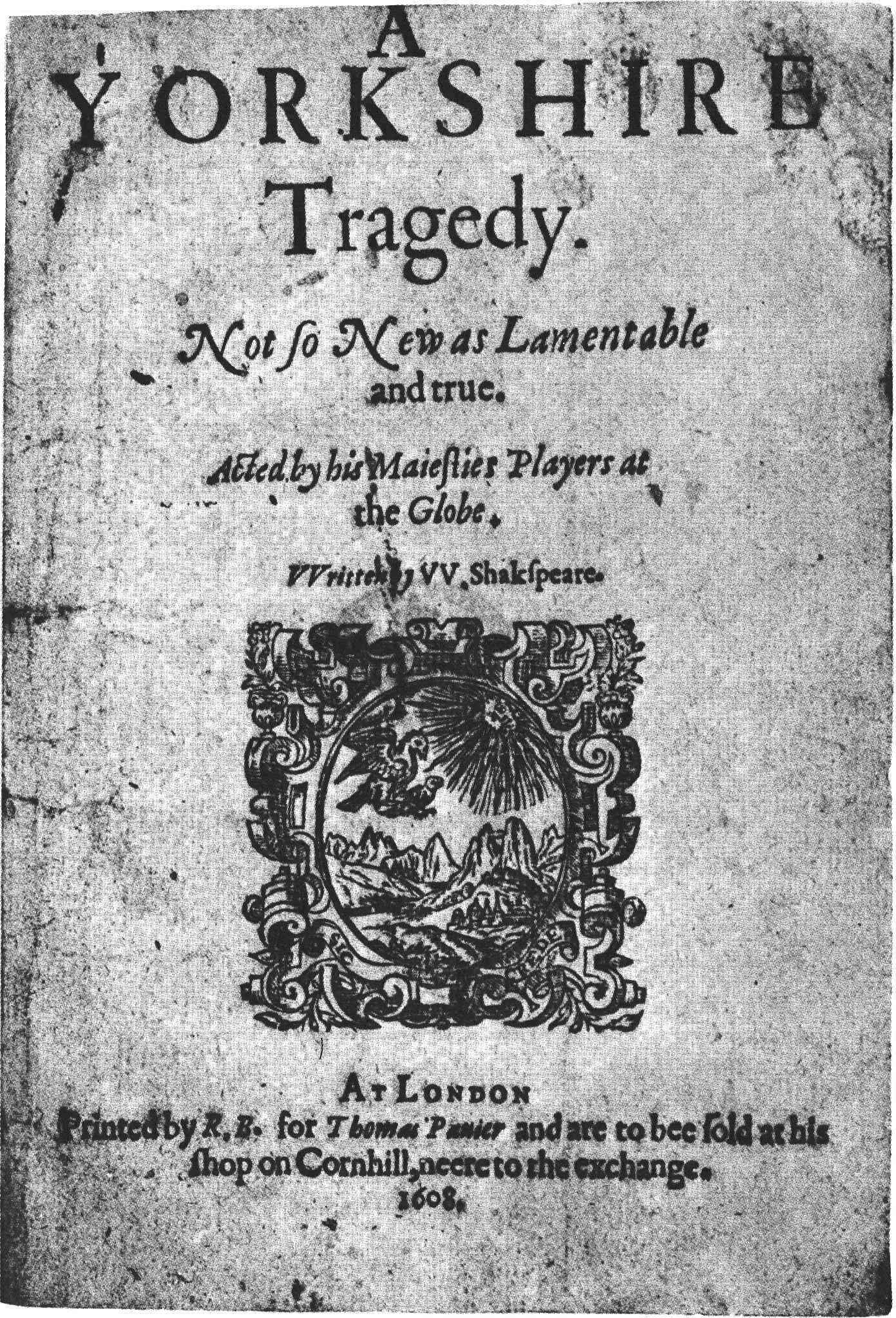|
Philip Chetwinde
Philip Chetwinde ( fl. 1653–1674) was a seventeenth-century London bookseller and publisher, noted for his publication of the Third Folio of Shakespeare's plays. A rough start Chetwinde was originally a clothworker. Through his 1637 marriage to Mary Allot, the widow of Second Folio publisher Robert Allot, Chetwinde acquired rights to Allot's published works – which included the rights to a substantial portion of the dramatic output of both Shakespeare and Ben Jonson. Chetwinde attempted to move into the publishing business after his marriage; but he faced opposition from the established booksellers and publishers, since he had not risen through the apprentice system of the Stationers Company. Chetwinde used his rights to Jonson's works in the publication of the Second Jonson folio of 1640–1, though that volume's publisher of record was Richard Meighen. It was not until 1653 that Chetwinde was able to operate fully as a stationer. Shakespeare In 1663, he employed his ri ... [...More Info...] [...Related Items...] OR: [Wikipedia] [Google] [Baidu] |
Third Folio
The earliest texts of William Shakespeare's works were published during the 16th and 17th centuries in quarto or folio format. Folios are large, tall volumes; quartos are smaller, roughly half the size. The publications of the latter are usually abbreviated to Q1, Q2, etc., where the letter stands for "quarto" and the number for the first, second, or third edition published. Plays Eighteen of the 36 plays in the First Folio were printed in separate and individual editions prior to 1623. ''Pericles'' (1609) and ''The Two Noble Kinsmen'' (1634) also appeared separately before their inclusions in folio collections (the Shakespeare Third Folio and the second Beaumont and Fletcher folio, respectively). All of these were quarto editions, with two exceptions: ''The True Tragedy of Richard Duke of York'', the first edition of ''Henry VI, Part 3'', was printed in octavo form in 1595, as was the 1611 edition of ''The most lamentable tragedy of Titus Andronicus''. In chronological order, t ... [...More Info...] [...Related Items...] OR: [Wikipedia] [Google] [Baidu] |
Locrine
''Locrine'' is an Elizabethan play depicting the legendary Trojan founders of the nation of England and of Troynovant (London). The play presents a cluster of complex and unresolved problems for scholars of English Renaissance theatre. Date ''Locrine'' was entered into the Stationers' Register on 20 July 1594 and published in 1595 in a quarto issued by printer Thomas Creede. Individual scholars have proposed dates for the play from the early 1580s on; many have favored a date c. 1591, based on the play's links with other works of the era. It has been argued, for example, that ''Locrine'' borrows from the ''Complaints'' of Edmund Spenser, published in 1591, and from ''The Complaint of Elstred,'' a poem by Thomas Lodge, written c. 1591, that circulated in manuscript before its first printing in 1593. The question of the play's date is complicated by the question of its authorship; if Charles Tilney was the play's author (see below), it must date prior to Tilney's death in 1586. Au ... [...More Info...] [...Related Items...] OR: [Wikipedia] [Google] [Baidu] |
Welsh Language
Welsh ( or ) is a Celtic language family, Celtic language of the Brittonic languages, Brittonic subgroup that is native to the Welsh people. Welsh is spoken natively in Wales, by some in England, and in Y Wladfa (the Welsh colony in Chubut Province, Argentina). Historically, it has also been known in English as "British", "Cambrian", "Cambric" and "Cymric". The Welsh Language (Wales) Measure 2011 gave the Welsh language official status in Wales. Both the Welsh and English languages are ''de jure'' official languages of the Welsh Parliament, the Senedd. According to the 2021 United Kingdom census, 2021 census, the Welsh-speaking population of Wales aged three or older was 17.8% (538,300 people) and nearly three quarters of the population in Wales said they had no Welsh language skills. Other estimates suggest that 29.7% (899,500) of people aged three or older in Wales could speak Welsh in June 2022. Almost half of all Welsh speakers consider themselves fluent Welsh speakers ... [...More Info...] [...Related Items...] OR: [Wikipedia] [Google] [Baidu] |
Lewis Bayly
Lewis may refer to: Names * Lewis (given name), including a list of people with the given name * Lewis (surname), including a list of people with the surname Music * Lewis (musician), Canadian singer * " Lewis (Mistreated)", a song by Radiohead from ''My Iron Lung'' Places * Lewis (crater), a crater on the far side of the Moon * Isle of Lewis, the northern part of Lewis and Harris, Western Isles, Scotland United States * Lewis, Colorado * Lewis, Indiana * Lewis, Iowa * Lewis, Kansas * Lewis Wharf, Boston, Massachusetts * Lewis, Missouri * Lewis, Essex County, New York * Lewis, Lewis County, New York * Lewis, North Carolina * Lewis, Vermont * Lewis, Wisconsin Ships * USS ''Lewis'' (1861), a sailing ship * USS ''Lewis'' (DE-535), a destroyer escort in commission from 1944 to 1946 Science * Lewis structure, a diagram of a molecule that shows the bonding between the atoms * Lewis acids and bases * Lewis antigen system, a human blood group system * Lewis number, a dimens ... [...More Info...] [...Related Items...] OR: [Wikipedia] [Google] [Baidu] |
Pericles, Prince Of Tyre
''Pericles, Prince of Tyre'' is a Jacobean play written at least in part by William Shakespeare and included in modern editions of his collected works despite questions over its authorship, as it was not included in the First Folio. It was published in 1609 as a quarto, was not included in Shakespeare's collections of works until the third folio, and the main inspiration for the play was Gower's ''Confessio Amantis''. Various arguments support the theory that Shakespeare was the sole author of the play, notably in DelVecchio and Hammond's Cambridge edition of the play, but modern editors generally agree that Shakespeare was responsible for almost exactly half the play — 827 lines — the main portion after scene 9 that follows the story of Pericles and Marina. Modern textual studies suggest that the first two acts, 835 lines detailing the many voyages of Pericles, were written by a collaborator, who may well have been the victualler, panderer, dramatist and pamphleteer Geo ... [...More Info...] [...Related Items...] OR: [Wikipedia] [Google] [Baidu] |
A Yorkshire Tragedy
''A Yorkshire Tragedy'' is an early Jacobean era stage play, a domestic tragedy printed in 1608. The play was originally assigned to William Shakespeare, though the modern critical consensus rejects this attribution, favouring Thomas Middleton. Date and text ''A Yorkshire Tragedy'' was entered into the Stationers' Register on 2 May 1608; the entry assigns the play to "Wylliam Shakespere." The play was published soon after, in a quarto issued by bookseller Thomas Pavier, who had published ''Sir John Oldcastle,'' another play of the Shakespeare Apocrypha, in 1600. The play was reprinted in 1619, as part of William Jaggard's False Folio. It was next reprinted in 1664, when Philip Chetwinde included it among the seven plays he added to the second impression of the Shakespeare Third Folio. Form and genre The play is unusual in consisting of only ten scenes. The original printed text of the play identifies it as "ALL'S ONE. OR, One of the foure Plaies in one, called a York-Shire T ... [...More Info...] [...Related Items...] OR: [Wikipedia] [Google] [Baidu] |
Thomas Lord Cromwell
''Thomas Lord Cromwell'' is an Elizabethan history play, depicting the life of Thomas Cromwell, 1st Earl of Essex, the minister of King Henry VIII of England. The play was entered into the Stationers' Register on 11 August 1602 by William Cotton and was published in quarto later the same year by bookseller William Jones, for whom it was printed by Richard Read. The title page of Q1 specifies that the play was acted by The Lord Chamberlain's Men, and attributes the play to a "W. S." A second quarto (Q2) was printed in 1613 by Thomas Snodham. The Q2 title page repeats the data of Q1, though the Lord Chamberlain's Men are now the King's Men (the name change having occurred in 1603). The "W. S." of the quartos was first identified as William Shakespeare when publisher Philip Chetwinde added the play to the second impression of his Shakespeare Third Folio in 1664. Modern scholars reject the Shakespearean attribution; speculation, relying on common initials, has shone on Wentworth S ... [...More Info...] [...Related Items...] OR: [Wikipedia] [Google] [Baidu] |
Sir John Oldcastle
''Sir John Oldcastle'' is an Elizabethan play about John Oldcastle, a controversial 14th-/15th-century rebel and Lollard who was seen by some of Shakespeare's contemporaries as a proto-Protestant martyr. Publication The play was originally published anonymously in 1600 (Q1), printed by Valentine Simmes for the bookseller Thomas Pavier. In 1619, a new edition (Q2) carried an attribution to William Shakespeare. The diary of Philip Henslowe records that the play was written by Anthony Munday, Michael Drayton, Richard Hathwaye and Robert Wilson. (An entry in Henslowe's Diary records a later payment to Drayton for a second part to the play, which has not survived; because of this fact, the extant play has sometimes been called ''Sir John Oldcastle, Part I'' or ''1 Sir John Oldcastle''.) In 1664, the play was one of the seven dramas added to the second impression of the Shakespeare Third Folio by publisher Philip Chetwinde. Historical figure Like other subjects of Elizabethan h ... [...More Info...] [...Related Items...] OR: [Wikipedia] [Google] [Baidu] |
The Puritan
''The'' () is a grammatical article in English, denoting persons or things already mentioned, under discussion, implied or otherwise presumed familiar to listeners, readers, or speakers. It is the definite article in English. ''The'' is the most frequently used word in the English language; studies and analyses of texts have found it to account for seven percent of all printed English-language words. It is derived from gendered articles in Old English which combined in Middle English and now has a single form used with pronouns of any gender. The word can be used with both singular and plural nouns, and with a noun that starts with any letter. This is different from many other languages, which have different forms of the definite article for different genders or numbers. Pronunciation In most dialects, "the" is pronounced as (with the voiced dental fricative followed by a schwa) when followed by a consonant sound, and as (homophone of pronoun ''thee'') when followed by a v ... [...More Info...] [...Related Items...] OR: [Wikipedia] [Google] [Baidu] |
The London Prodigal
''The London Prodigal'' is a play in English Renaissance theatre, a city comedy set in London, in which a prodigal son learns the error of his ways. The play was published in quarto in 1605 by the stationer Nathaniel Butter, and printed by Thomas Creede. In 1664 it was one of the seven plays that publisher Philip Chetwinde added to the second impression of his Third Folio of William Shakespeare's plays. The play was not entered into the Stationers' Register, but it is attributed to Shakespeare on the title page of the only edition. This attribution is widely and generally rejected by scholars. The title page also identifies the play as a King's Men's play. ''The London Prodigal'' has been dated as early as c. 1591, and as late as 1603–04. It is one of a long series of "prodigal son" plays that reach back as far as the Bible for inspiration and precedent; but it is also an example of the evolving Elizabethian genre of domestic dramas, and "one of the first naturalistic drama ... [...More Info...] [...Related Items...] OR: [Wikipedia] [Google] [Baidu] |
1664 In Literature
This article presents lists of the literary events and publications in 1664. Events *February – London publisher John Twyn is hanged, drawn and quartered, having been convicted of treason for distributing seditious literature. *April 6 – Moses ben Isaac Bonems is the first signatory of the approbations to works given by the members of the Council of Four Lands at the ''Gramnitza'' (candlestick) fair. *May 12 – Molière's comedy ''Tartuffe'' is performed in its original version as part of "The Pleasures of the Enchanted Island" at the court of King Louis XIV of France to mark the start of construction of the Palace of Versailles, but objections to its presentation of a hypocritical religious impostor ban it from later public presentation. *June – ''Gazzetta di Mantova'' is first published in Mantua, Italy. By 2009 it will be the world's oldest private newspaper still published, and the oldest one continuously published in print. * June 20 – Racine's tragedy ''La Thébaï ... [...More Info...] [...Related Items...] OR: [Wikipedia] [Google] [Baidu] |





.png)